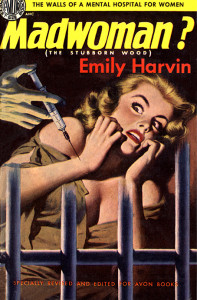
What does it say about an individual that has read many of the titles on ABE’s list of books with mental illness? Don’t answer that. If I haven’t read the book, I’ve seen the TV movie, or big screen drama. Their list isn’t a long one, but it’s chock full of loony bin delights such as One Flew Over the Cuckoo’s Nest, Sybil, The Snake Pit, Girl, Interrupted, Ordinary People, I Never Promised You a Rose Garden. And these are just the titles made into screen dramas. I’ve seen all, except Rose Garden–does hearing the muzak version of the song over and over until I became nutsy, count?
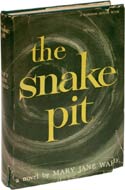
One Flew Over the Cuckoo’s Nest is a dim memory, something with crazy Jack Nicholson and the indelible Nurse Hatchet. I realize people have dubbed it a classic, although I figured Jack was playing himself. Without the lobotomy, though. Sybil made Sally Field’s days of flying around in a nun’s outfit or surfing in a bikini, a thing of the past. She really was marvelous. Too bad experts claim the entire multiple personality thing was a fraud. Does that mean ALL people who are many people are only one person again? Confusing. The Snake Pit charms us with sweet Melanie from Gone With The Wind, coping with crazyland in an overcrowded inhumane mental institution that from above looks like the inmates are snakes in a pit–except a mental patient can’t see from that angle, so, I guess imagination is a good part of Olivia Haviland’s condition.
The only thing I remember about Girl, Interrupted, is how much I disliked brother-kissing, Angelina Jolie. Ordinary People was the film that got to me. It was just that–about a regular family going about their lives until a
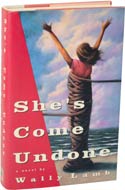
tragedy strikes and one son is killed while the other survives. The mother can’t hide her disappointment that the wrong son lived, guilt proves too much for the teen, and he tries to kill himself. The boy’s horror of a girl’s suicide whom he befriended from the mental facility chills me just thinking about it. In this case, I also read the book. Good of me, right?
I read The Bell Jar, Sylvia Plath’s single novel. Hasn’t every female who went through high school or college? And I’ve forgotten all of it, but remember it was good. Same deal with She’s Come Undone by Wally Lamb. I remember enjoying the fact of the fat protagonist–I hope I have the right book–I read it before the juggernaut that was Oprah’s book club was born. Other than that, you could tell me it’s about space travel and I’d have no way to refute that supposition, my mind loses relative data on a long ago read. I do remember almost all of The Yellow Wallpaper, by Charlotte Perkins Gilman. Why this book, you may
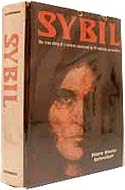
query? Because it’s a skinny longer short story, and every damn acting student from here to Timbuktu would use it for their monologue or audition piece. God, to be the director that hears it again and again in various bad readings–that is the definition of insanity.
On the nonfiction end, I’ve read An Unquiet Mind, and didn’t believe a word of it–OK, I believed the woman may be bi-polar–but how is it possible with all that upheaval and mood yo-yoing could she be a successful practicing psychiatrist? I mean, really? No one noticed a thing? Missing for days, erratic behavior, nothing struck her colleagues as odd enough to question? I would like to know her secret of juggling mental illness and a successful career. Hell, I’d just like the secret to a successful career. Not on the list, but should be–my newest favorite book, as I’ve documented, The Sociopath Next Door. Every time I am in B&N I read another couple of chapters, and am struck by how clear cut the definition of a sociopath really is, and how many are out in public parading as not only regular people, but successful entrepreneurs. An individual with rather frightening hair comes to mind. Those that are sociopaths don’t act at all crazy. At least, not unless they are killing people, which is not the majority. I know, that fact blew me away too! Instead, these individuals are charming, attractive, outgoing, usually successful people who will wreak havoc and destruction in their wake, with most of us blind to their actions.
I think the book that most affected me is Darkness Visible by William Styron. Here is an artist, a poetic writer, putting to paper his personal struggles with major depression. His passages
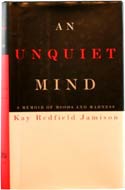
describing the hell of depression, the grayness, can be understood by every one, whether they have had similar experiences or not. That’s one thing about any mental disruption. It’s rare that anyone outside of the beleaguered individual understands what that person is experiencing. The afflicted cannot be understood. Styron eliminates that excuse with his book. After reading it, everyone will have a deeper more personal viewpoint of just what depression and mental illness is. If they don’t, they’re just plain crazy.
